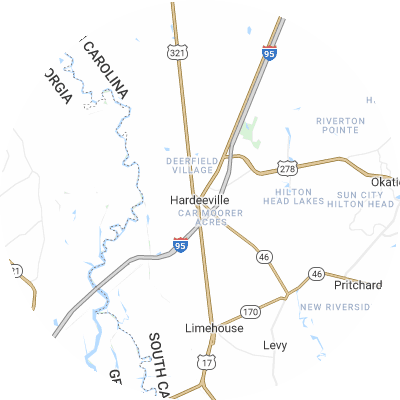Please enter a valid 5-digit zip code!
Written By David Cusick
Last Updated April 2024
Solar is one of the most easily accessible forms of renewable energy for Hardeeville homes. Transitioning to solar energy can reduce your monthly energy expenses and shrink your carbon output. Before you begin the process, you want to make sure you find a trustworthy installer. Luckily, we've reviewed the options and compiled a guide to the best and most reliable solar installation providers in Hardeeville.
Reliable customer support
Clear pricing policy
Informative resources
Services Offered
Reliable customer support
Clear pricing policy
Free quotes
Services Offered
Free quotes
Informative resources
Clear pricing policy
Services Offered
Today's Homeowner looks at dozens of datapoints on solar companies to come up with our data-driven rankings. It's not possible for a company to pay for preferential treatment in our rankings. We look at the following key factors in determining who should top our list:
Putting solar panels on your roof could reduce your electricity payments while helping the environment by reducing your carbon footprint through renewable energy use. Key considerations when looking at local solar installers are as follows.
Confirm that your solar installer is properly licensed. This helps ensure that the work is done properly using the most up-to-date installation methods. South Carolina law draws a difference between mechanical and general contractors for solar energy work. A licensed mechanical contractor can install or repair any solar PV system rated for between 50 and 600 volts if they have an electrical Certificate of Authorization. If a company installs solar thermal systems, they need a Certificate of Authorization in plumbing and a supervising licensed plumber on their team.
Check review sites like Google Reviews, the Better Business Bureau (BBB), and TrustPilot to see feedback from past customers on local solar companies. Detailed reviews can help you assess a company's dependability and customer service. Use caution with companies that have barely any reviews or mostly negative ones.
Call 3–5 solar companies for free, itemized quotes. A quote should explain all costs and list the solar equipment included. Reviewing multiple quotes helps identify the most cost-effective option for your budget.
Quality solar installations should come with comprehensive workmanship and performance warranties. The workmanship guarantee covers any installation problems such as cracks in the panels, poor alignment, or poor wiring. The performance guarantee ensures a specific energy output level. Strong guarantees indicate that a solar installer trusts its installations.
Switching to solar power can help decrease your energy expenses. Be sure to consider these aspects when judging the cost and value of solar panels.
Solar panel costs vary based on your system's capacity and the technology used. The average solar system in Hardeeville has a capacity of 7.4 kilowatts. Homeowners in the area can expect to pay around $3,450 per kilowatt; the average Hardeeville homeowners spends about $17,991 on a new solar system after accounting for federal tax breaks. (Some homeowners prefer to lease solar panels to lower upfront costs.) A personalized quote from a local solar company will account for things like the capacity, panel type, and size of the planned system, and should include prices for permit fees, preliminary work, and labor.
Incentive Type: Property Tax Incentive
Incentive Amount:
100% exemption
Generally speaking, a solar photovoltaic (PV) system can be used to power any household appliance or system that uses electricity. In the smallest case, you can use a solar water heating system.
With home solar energy, you can recoup the cost of the system over time, lower your home's carbon footprint, and gain additional energy independence.
Generally speaking, your energy bills will decrease significantly after you install solar panels. This is because you're using the energy you generate for free rather than buying it from your power company. In Hardeeville, the average amount someone can save is $1,745 per year. With net metering programs offered by many utilities, you could ultimately make a profit from your system after the payback period concludes.
Your payback period is the time to earn a net profit from your solar panels. It will vary based on the average sunlight in your area, their rated capacity, and the rate your utility charges per kilowatt of power. Hardeeville has extremely high daily sunlight levels, so you could recoup your investment in as little as 10.3 years per 5 kW of rated capacity.
Of course. Solar panels are independent of the Hardeeville grid and will continue to generate power even if the grid is having problems. Keep in mind, however, that a solar system won't take you through a nighttime outage if you don't have a storage system. Your contractor can discuss some economical options to keep your home's power access reliable through the worst conditions, including battery backups or an emergency generator.
The answer will depend on your specific needs and goals. Generally, monocrystalline solar panels are the most efficient for Hardeeville homes. However, if lowering cost is your top priority, then you could polycrystalline or thin-film solar panels. When you're choosing a contractor, make sure to ask about the brand names and models of solar panels a contractor offers and the benefits and drawbacks of each.
